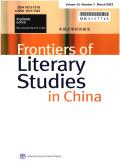李汝谦,十九世纪的鲁迅
IF 0.1
4区 文学
0 ASIAN STUDIES
引用次数: 0
摘要
摘要本文论述了李汝谦(1852-1909)的生平、思想和作品。1882–84年,他被任命为驻神户领事,在此期间,他研究了明治日本和西方的政治制度和文化,最终将华盛顿·欧文的乔治·华盛顿传记翻译成文言文,这本书对晚清改革者产生了巨大影响。李的文学理论强调独创性的重要性。他还培养了一种比许多同时代人更简单、更接近汉语口语的风格。他最终支持对中国政府和社会进行彻底改革。他放弃了中国文化中心的观点,转而采用文化相对论的世界观,在这种世界观中,世界上所有的文化都被视为同等有效。回国后,李更多地参与到改革活动中,但很快他就几乎完全脱离了中国社会,甚至开始对整个古典文学传统表示强烈的怀疑。在他的诗歌和散文作品中,他警告中国知识分子放弃自鸣得意的保守主义,适应新世界,否则就会灭亡。他用尖刻的讽刺文章取笑自己的社会,让人想起鲁迅五四时代的作品。事实上,李汝谦可能是第一个发展出中国人的不足和内疚观念的中国作家,这种观念在下个世纪的文学中非常普遍。本文章由计算机程序翻译,如有差异,请以英文原文为准。
Li Ruqian, the Lu Xun of the Nineteenth Century
AbstractThis paper discusses the biography, thought, and works of Li Ruqian (1852–1909). He was appointed Consul in Kobe 1882–84, during which period he studied the political institutions and culture of Meiji Japan and the West, eventually translating Washington Irving’s biography of George Washington into Classical Chinese, a book which exercised a great influence on late Qing reformers. Li’s literary theory strongly emphasized the importance of originality. He also cultivated a style that was simpler and closer to spoken Chinese than many of his contemporaries. He eventually espoused a thoroughgoing reform of Chinese government and society. He abandoned the idea of the centrality of Chinese culture for a worldview of cultural relativity in which all cultures of the world are viewed as equally valid. After his return to China Li became even more involved in reform activities, but soon he became almost totally alienated from Chinese society and even began expressing strong doubts about the whole tradition of classical writing. In his poems and prose works, he warned Chinese intellectuals to abandon their smug conservatism and adapt to the new world or perish, making fun of his own society in biting satirical pieces that remind one of the writings of Lu Xun’s May Fourth era. Li Ruqian may, indeed, be the first Chinese author to develop the idea of Chinese inadequacy and guilt which is so common in the literature of the next century.
求助全文
通过发布文献求助,成功后即可免费获取论文全文。
去求助
来源期刊

Frontiers of Literary Studies in China
Multiple-
CiteScore
0.10
自引率
0.00%
发文量
360
期刊介绍:
Frontiers of Literature in China seeks to provide a forum for a broad blend of peer-reviewed academic papers of literature in order to promote communication and exchanges between litterateurs in China and abroad. It will reflect the enormous advances made in China in the field of literature in recent years. In addition, this journal also bears the mission of introducing the academic achievements on Chinese literature research to the world. The coverage will include the following main branches of literature, both theoretical and applied: ancient Chinese literature, modern Chinese literature and contemporary Chinese literature.
 求助内容:
求助内容: 应助结果提醒方式:
应助结果提醒方式:


